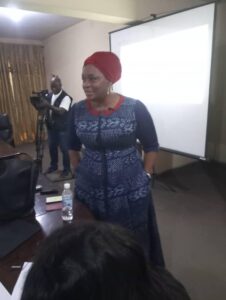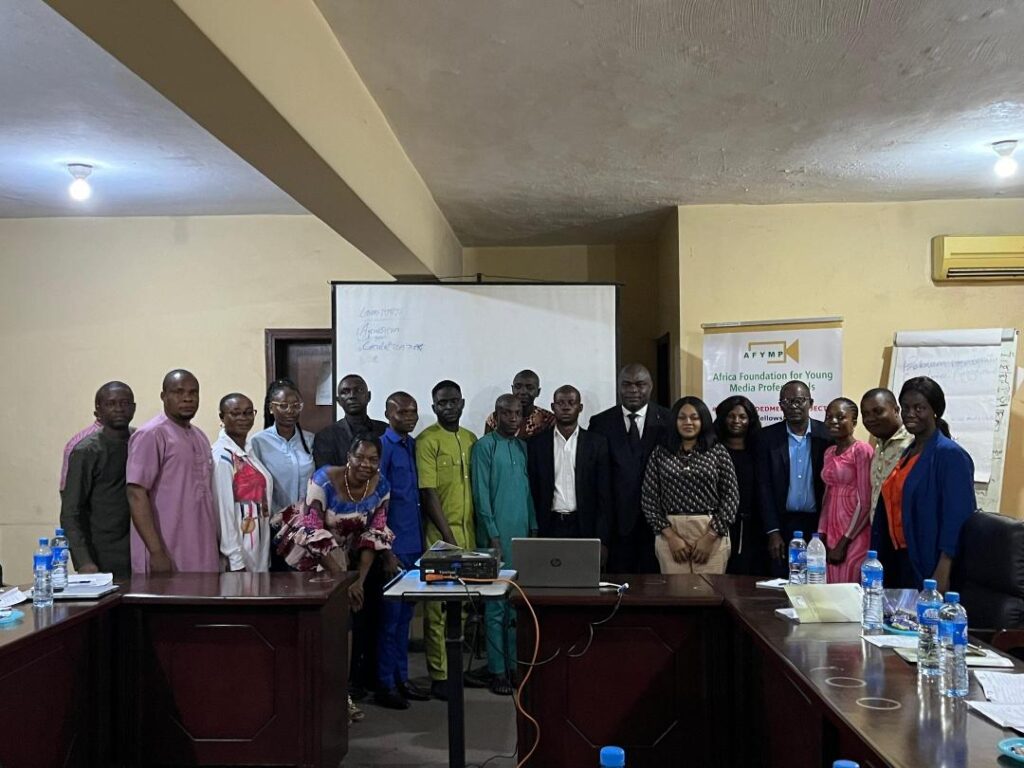The Africa Foundation for Young Media Professionals on June 5-6, 2024 held a two-day “Media Entrepreneurship 2024” fellowship in Lagos with support from the Wole Soyinka Centre for Investigative Journalism (WSCIJ) and Mac Arthur Foundation.
Various multimedia, television, and radio experts shared a common message with participants: passion alone is not enough to succeed in the media industry, but a sound business model, professionalism, and other key elements are crucial for thriving as a media entrepreneur. DAYO EMMANUEL reports.
Transforming Passion into Profit
Young media entrepreneurs have been urged to treat their media ventures as real businesses with a focus on profitability at a media fellowship held at the Centre for Management Development (CMD), Lagos.
Mrs Toun Okewale Sonaiya, founder of Women Radio 91.7FM, delivered the opening presentation titled “Media Business and Technology: Implications for Entrepreneurs.”
She emphasised that running a media business requires more than just passion, but requires a professional approach to achieve financial stability and sustainability.

Sonaiya shared insights from her own experience, noting that, her organisation has never missed a salary payment in its eight and a half years of operation.
“We run Women Radio professionally, which is why we have maintained financial stability,” she said and advised media owners to prioritize the business side of their operations to ensure they can pay their employees and sustain their ventures.
“We need to respect those who do this business,” she said. “Passion alone is not enough; you must sustain your business if you call yourself an entrepreneur.”
Adapting to the Changing Media Landscape
Editor of TheCable, Kolapo Olapoju stressed the importance of taking the media business seriously due to the rapidly changing landscape and highlighted the decline in traditional news consumption methods and the rise of digital platforms.
“In recent years, traditional means for news media have constantly declined in visibility and sustainability,” Olapoju said. He pointed out that while television and print media have seen significant declines in the audience, online platforms have grown, indicating a shift in how people consume news.
Olapoju advised participants to carve out unique niches instead of trying to compete in breaking news. “You have to be creative to remain sustainable. Sustainability is not all about finance; it’s also about maintaining your editorial independence.”
Importance of Unique, Verified Content
Omotola Adebajo, an Editor at the BBC in Lagos, encouraged participants to produce unique content. “You can’t make money with copy and paste; nobody pays for that,” she said.
Adebajo highlighted the importance of verifying content before publishing, a practice that distinguishes reputable media organisations.
“In my organisation, we don’t rush to break the news; we wait to verify,” she explained, emphasising that professionalism and in-depth analysis are crucial in a media environment where everyone can publish news with a smartphone.
Operating from a Business Perspective
Yinka Olaito, the convener of the event and Executive Director of the Africa Foundation for Young Media Professionals urged participants to approach their media ventures from a business perspective. “Your passion will not pay your children’s school fees or your transport fare,” he warned.
Olaito stressed the need for a business model and identifying income streams. “Without a business model, you are lost in the business of news.”
Ladehinde Kayode, an editor at Television Continental, explained the importance of understanding the paying and non-paying public. Paying publics bring revenue, while non-paying publics enhance credibility. “The paying public wants to see you have the figure, which you can’t keep without quality content,” he said.
Balancing Content for Credibility
Kayode also advised against overloading media spaces with paid content at the expense of what interests the general public. “Learn to say no. Don’t just populate your airtime with paid content because your audience will find it boring. Credibility is key,” he admonished.
Ethical Media Practices
Executive Director of Media Career Development Network, Lekan Otufodunrin focused on media ethics in his session. “Ethics are principles that guide us to make a positive impact through our decisions and actions,” he explained. He emphasized the importance of ethical journalism in building trust with the audience.
“Every profession has its ethics. As journalists, the stories we publish have implications, and we must be guided by ethics,” he said.
Otufodunrin, a media career expert and author noted that ethical storytelling involves speed and accuracy, urging participants to prioritize truth and confirmed accounts.
Building Trust
“Trust is also a currency,” Otufodunrin added. “If people trust your platform, it will show because online journalism is about speed and accuracy. Ethical storytelling is telling the confirmed account. When in doubt, you must leave it out.”
The fellowship highlighted the critical balance between passion and business acumen in the media industry. By combining professionalism, ethical practices, and a strong business model, young media entrepreneurs can achieve sustainability and success in a rapidly evolving media landscape.
Participants took turns to share their knowledge gained at the fellowship.
Chioma Obinagwam, publisher of Confiance News, expressed gratitude for the training. “I’m grateful for this training. I’ve learned so many things. To have a sustainable business, you need to build a community, send newsletters, and be ethical.”
Dupeola, publisher of Insight News, emphasized the importance of doing original stories and engaging the audience.
Dayo Afolabi was elated after the fellowship. “I am happy I participated. I learned that journalism is a business from which you can be enriched.”
Bose Adelaja, publisher of Citizens Compass, shared her insights. “I learned that when you attend an event, you should post immediately, even if it’s just a short video. I also learned the importance of extending my partnerships.”
Mukthar Ajelogbon, publisher of Osun Reporters News, said, “I’m going home with two key lessons. I will leverage working with colleagues and focus on creating unique content, especially in investigative reporting, to attract grants and do more work.”
Olusegun Hosea, who publishes Exponent Magazine online, stated, “I learned how to spotlight companies and brands and how to write quality stories to create newsletters that generate revenue to sustain my brand.”
Olatunmbi Olufunke, publisher of News Indicator, declared, “I’m no longer running a charity organization. I’ve learned to set my rates to avoid exploitation of journalists.”
Olamide Tejuosho remarked, “I’ve learned that poverty is very expensive, and we need to grow our media outfits and run them like businesses, not as charities.”

